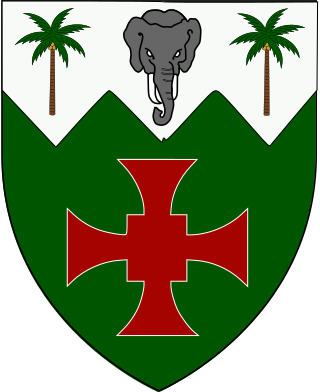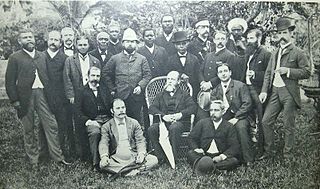Related Research Articles

Samuel Ajayi Crowther, was a Nigerian linguist, clergyman, and the first African Anglican bishop of West Africa. Born in Osogun, he and his family were captured by slave raiders when he was about twelve years old. This took place during the Yoruba civil wars, notably the Owu wars of (1821–1829), where his village Osogun was sacked. Ajayi was later on resold to Portuguese slave dealers, where he was put on board to be transported to the New World through the Atlantic.

Fourah Bay College is a public university in the neighbourhood of Mount Aureol in Freetown, Sierra Leone. Founded on 18 February 1827, it is the first western-style university built in Sub-Saharan Africa and, furthermore, the first university-level institution in Africa. It is a constituent college of the University of Sierra Leone (USL) and was formerly affiliated with Durham University (1876–1967).

Davidson Sylvester Hector Willoughby Nicol or pen named Abioseh Nicol was a Sierra Leone Creole academic, diplomat, physician, writer and poet. He was able to secure degrees in the arts, science and commercial disciplines and he contributed to science, history, and literature. Nicol was the first African to graduate with first class honours from the University of Cambridge and he was also the first African elected as a fellow of a college of Cambridge University. Davidson Nicol also contributed to medical science when he was the first to analyse the breakdown of insulin in the human body, a discovery which was a breakthrough for the treatment of diabetes.

Edward Wilmot Blyden was a Liberian educator, writer, diplomat, and politician who was primarily active in West Africa. Born in the Danish West Indies, he joined the waves of black immigrants from the Americas who migrated to the country. Blyden became a teacher for five years in the British West African colony of Sierra Leone in the early twentieth century. His writings on pan-Africanism became influential throughout West Africa, attracting attention in countries such as the United States as well. He believed that Zionism was a model for what he termed Ethiopianism, and that African Americans could return to Africa and help in the rebuilding of the continent.
Herbert Christian Bankole-Bright was a well-known political activist in Sierra Leone.

Gerald Sharp was an English-born Anglican clergyman, Archbishop of Brisbane 1921–1933.
Richard Beale Blaize was a Nigerian-Sierra Leonean businessman, newspaper publisher, financier, and black nationalist of Sierra Leonean and Nigerian heritage.

David George was an African-American Baptist preacher and a Black Loyalist from the American South who escaped to British lines in Savannah, Georgia; later he accepted transport to Nova Scotia and land there. He eventually resettled in Freetown, Sierra Leone where he would eventually die. With other slaves, George founded the Silver Bluff Baptist Church in South Carolina in 1775, the first black congregation in the present-day United States. He was later affiliated with the First African Baptist Church of Savannah, Georgia. After migration, he founded Baptist congregations in Nova Scotia and Freetown, Sierra Leone. George wrote an account of his life that is one of the most important early slave narratives.

The Sierra Leone Grammar School was founded on 25 March 1845 in Freetown, Sierra Leone, by the Church Mission Society (CMS), and at first was called the CMS Grammar School. It was the first secondary educational institution for West Africans with a European curriculum. Many of the administrators and professionals of British West Africa were educated at the school.
Hannah Benka-Coker,, néeLuke was an educator from Sierra Leone. She is one of the founders of the Freetown Secondary School for Girls (FSSG) which was established in 1926.

Robert Smith FRCSE (1840–1885), also known as Bob Smith, was a Sierra Leonean medical doctor who served as Assistant Colonial Surgeon of Sierra Leone during the late nineteenth century. Smith was the first African to become a Fellow of the Royal College of Surgeons of Edinburgh after completing his medical studies at the University of Edinburgh.

Sir William Shelford (1834–1905) was an English civil engineer.

The Sierra Leone Creole people are an ethnic group of Sierra Leone. The Sierra Leone Creole people are descendants of freed African-American, Afro-Caribbean, and Liberated African slaves who settled in the Western Area of Sierra Leone between 1787 and about 1885. The colony was established by the British, supported by abolitionists, under the Sierra Leone Company as a place for freedmen. The settlers called their new settlement Freetown. Today, the Sierra Leone Creoles are 1.2 percent of the population of Sierra Leone.

Orishatukeh Faduma was an African-American Christian missionary and educator who was also an advocate for African culture. He contributed to laying the foundation for the future development of African studies.

Sir Samuel Rowe was a British doctor and colonial administrator who was twice governor of Sierra Leone, and also served as administrator of the Gambia, governor of the Gold Coast and governor-general of the West Africa settlements. He was known for his ability to form pro-British relationships with the local people. He was in favour of a vigorous programme of expansion from the coast into the interior in response to French activity in the Sahel region, at times in opposition to Colonial Office policy.
George Stringer Bull (1799–1865) was an English missionary and cleric, a social and industrial reformer in the Bradford area.
The history of black people in Cambridge, UK cannot easily be separated from the history of Cambridge University. The university has attracted students from Africa and the African diaspora to the town of Cambridge for more than two centuries. Several notable black people had a Cambridge association in the eighteenth and nineteenth centuries, and at the end of the eighteenth century Cambridge became a centre of abolitionist sentiment. From the end of the nineteenth century the university started to admit black students in larger numbers. In recent decades, however, the relatively low number of black students admitted to the university has become a topic of media comment and public concern.
The Smith family is a Sierra Leone Creole family of English, Jamaican Maroon and Liberated African descent based in Freetown, Sierra Leone. The Smiths were first-generation Sierra Leone Creoles of Gold Coast Euro-African and Caribbean origin who settled in Sierra Leone during the early 19th century. There are several descendants of the family in the United Kingdom and the United States, as well as in the Ghanaian cities of Accra and Cape Coast. Several members of the family were active in business, women's education, civil administration, the arts, medicine, poetry, the judiciary, cultural studies, Pan-Africanism and anti-colonial activism.
References
- 1 2 3 4 "Nicol, G. Gurney M.". Dictionary of African Christian Biography . Retrieved 31 October 2020.
- 1 2 3 4 "Nicol, George Gurney Mather (NCL875GG)". A Cambridge Alumni Database. University of Cambridge.
- 1 2 Akintola J. G. Wyse (1989). The Krio of Sierra Leone: An Interpretive History. C. Hurst & Co. Publishers. p. 34. ISBN 978-1-85065-031-7.
- ↑ "Nicol, George". Dictionary of African Christian Biography . Retrieved 31 October 2020.